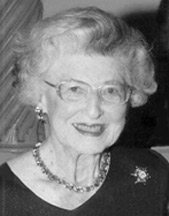Influential educator, researcher, consultant and advisor
Frances Lomas Feldman, born in 1912, was Distinguished Professor Emerita of Social Work at the University of Southern California, where she taught social welfare history, policy, and administration for 35 years after fifteen years in public and private social agencies as caseworker, administrator, researcher and consultant. Even after retirement, she remained active in university and community affairs, engaged in research, and continued to write. Her name is legend in southern California social work circles. She represents the best in the social work profession and, because of her enormous contribution to the field, was among the first to be nominated as a living inductee into the Social Work Hall of Distinction.
Her list of accomplishments is vast, her influence significant, and her professional and personal relations life-long. Whether she was teaching, conducting groundbreaking studies, establishing innovative programs, or advising university presidents, special state public commissions or corporate heads or serving on public or private social welfare boards or committees, anyone who knew her was changed.
One of her early seminal research interests was the psychological and social meanings of money and work in family life; it led to several research and demonstration projects, the founding of the non-profit consumer credit counseling movement and the innovation of pioneering programs in industrial social work. She chaired the Child Welfare Division of the Los Angeles Welfare Planning Council that was instrumental in the passage of the important 1950 legislation. She served as academic consultant to the McCone Commission on the 1965 Watts Riots in Los Angeles, and the supplemental report she authored contributed to some health and welfare policy changes. She took special pride in an extensive demonstration-research project conducted in rural Alaska in the late 1960s that had important effects on Eskimo village life. Her research on the workplace and cancer health histories has been much cited in later psycho-social research in the arena of cancer.
A deep interest in history and human services led to the founding of the California Social Welfare Archives and a continuing interest in the preservation of records that reflect the social programs that flourished in southern California during its history. As part of an institutional study of the City of Los Angeles from its birth as an American city, she documented and wrote Human Services in the City of Los Angels for which she received the 2004 Wheat Award from the Southern California Historical Society.
Over the span of her professional life and remarkable career, she received many awards. With a problem to solve, whether professional or personal, an amazing number of professional associates and friends would turn to her for help and never go away empty-handed. A remarkable social worker and teacher, an unforgettable friend, and a force for good in California over an entire lifetime, Frances Lomas Feldman was a prime example of what one person can do to make the world better.
